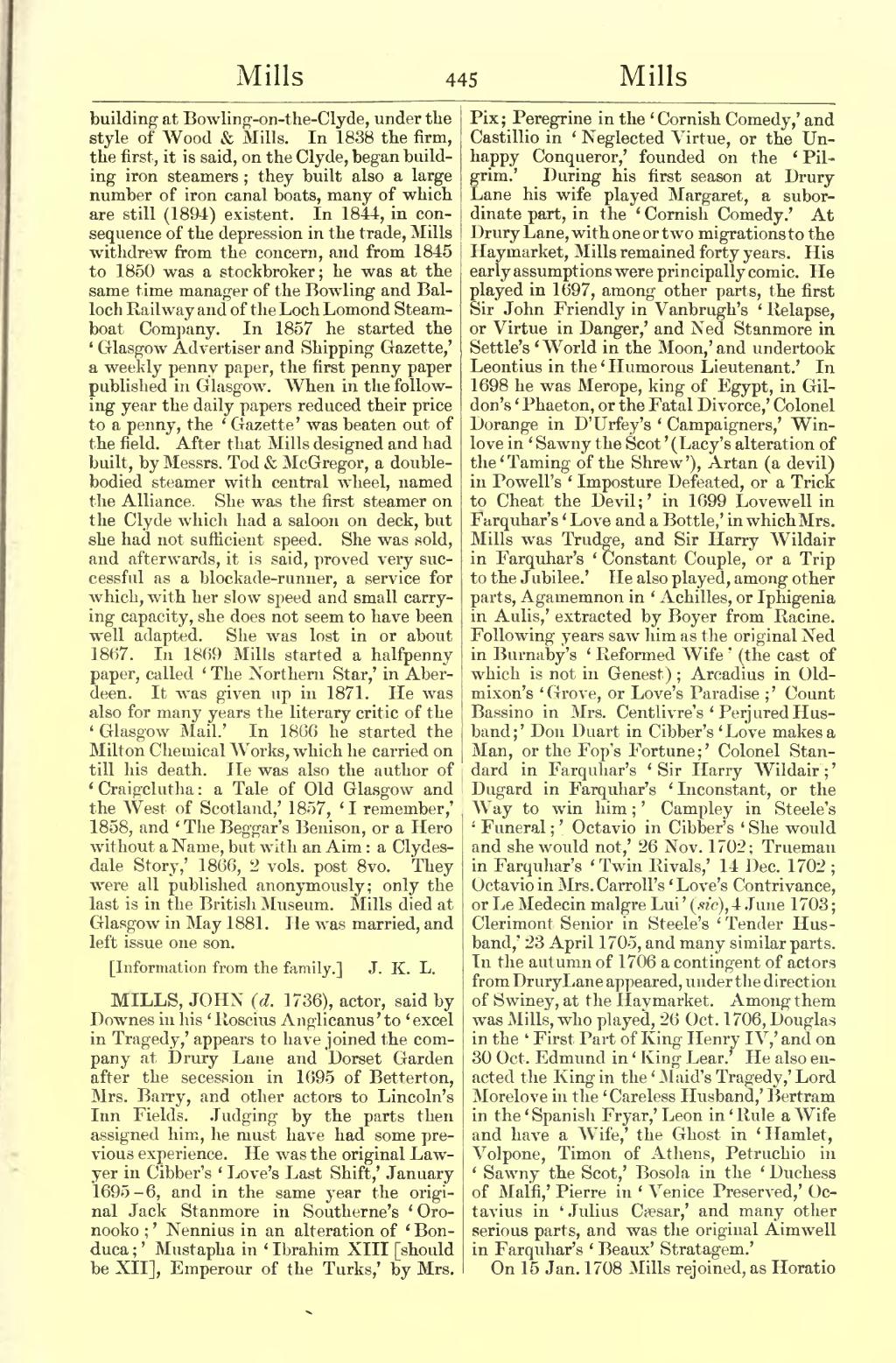building at Bowling-on-the-Clyde, under the style of Wood & Mills. In 1838 the firm, the first, it is said, on the Clyde, began building iron steamers; they built also a large number of iron canal boats, many of which are still (1894) existent. In 1844, in consequence of the depression in the trade, Mills withdrew from the concern, and from 1845 to 1850 was a stockbroker; he was at the same time manager of the Bowling and Balloch Railway and of the Loch Lomond Steamboat Company. In 1857 he started the ‘Glasgow Advertiser and Shipping Gazette,’ a weekly penny paper, the first penny paper published in Glasgow. When in the following year the daily papers reduced their price to a penny, the ‘Gazette’ was beaten out of the field. After that Mills designed and had built, by Messrs. Tod & McGregor, a double-bodied steamer with central wheel, named the Alliance. She was the first steamer on the Clyde which had a saloon on deck, but she had not sufficient speed. She was sold, and afterwards, it is said, proved very successful as a blockade-runner, a service for which, with her slow speed and small carrying capacity, she does not seem to have been well adapted. She was lost in or about 1867. In 1869 Mills started a halfpenny paper, called ‘The Northern Star,’ in Aberdeen. It was given up in 1871. He was also for many years the literary critic of the ‘Glasgow Mail.’ In 1866 he started the Milton Chemical Works, which he carried on till his death. He was also the author of ‘Craigclutha: a Tale of Old Glasgow and the West of Scotland,’ 1857, ‘I remember,’ 1858, and ‘The Beggar's Benison, or a Hero without a Name, but with an Aim: a Clydesdale Story,’ 1866, 2 vols. post 8vo. They were all published anonymously; only the last is in the British Museum. Mills died at Glasgow in May 1881. He was married, and left issue one son.
[Information from the family.]
MILLS, JOHN (d. 1736), actor, said by Downes in his ‘Roscius Anglicanus’ to ‘excel in Tragedy,’ appears to have joined the company at Drury Lane and Dorset Garden after the secession in 1695 of Betterton, Mrs. Barry, and other actors to Lincoln's Inn Fields. Judging by the parts then assigned him, he must have had some previous experience. He was the original Lawyer in Cibber's ‘Love's Last Shift,’ January 1695–6, and in the same year the original Jack Stanmore in Southerne's ‘Oronooko;’ Nennius in an alteration of ‘Bonduca;’ Mustapha in ‘Ibrahim XIII [should be XII], Emperour of the Turks,’ by Mrs. Pix; Peregrine in the ‘Cornish Comedy,’ and Castillio in ‘Neglected Virtue, or the Unhappy Conqueror,’ founded on the ‘Pilgrim.’ During his first season at Drury Lane his wife played Margaret, a subordinate part, in the ‘Cornish Comedy.’ At Drury Lane, with one or two migrations to the Haymarket, Mills remained forty years. His early assumptions were principally comic. He played in 1697, among other parts, the first Sir John Friendly in Vanbrugh's ‘Relapse, or Virtue in Danger,’ and Ned Stanmore in Settle's ‘World in the Moon,’ and undertook Leontius in the ‘Humorous Lieutenant.’ In 1698 he was Merope, king of Egypt, in Gildon's ‘Phaeton, or the Fatal Divorce,’ Colonel Dorange in D'Urfey's ‘Campaigners,’ Winlove in ‘Sawny the Scot’ (Lacy's alteration of the ‘Taming of the Shrew’), Artan (a devil) in Powell's ‘Imposture Defeated, or a Trick to Cheat the Devil;’ in 1699 Lovewell in Farquhar's ‘Love and a Bottle,’ in which Mrs. Mills was Trudge, and Sir Harry Wildair in Farquhar's ‘Constant Couple, or a Trip to the Jubilee.’ He also played, among other parts, Agamemnon in ‘Achilles, or Iphigenia in Aulis,’ extracted by Boyer from Racine. Following years saw him as the original Ned in Burnaby's ‘Reformed Wife’ (the cast of which is not in Genest); Arcadius in Oldmixon's ‘Grove, or Love's Paradise;’ Count Bassino in Mrs. Centlivre's ‘Perjured Husband;’ Don Duart in Cibber's ‘Love makes a Man, or the Fop's Fortune;’ Colonel Standard in Farquhar's ‘Sir Harry Wildair;’ Dugard in Farquhar's ‘Inconstant, or the Way to win him;’ Campley in Steele's ‘Funeral;’ Octavio in Cibber's ‘She would and she would not,’ 26 Nov. 1702; Trueman in Farquhar's ‘Twin Rivals,’ 14 Dec. 1702; Octavio in Mrs. Carroll's ‘Love's Contrivance, or Le Medecin malgre Lui’ (sic), 4 June 1703; Clerimont Senior in Steele's ‘Tender Husband,’ 23 April 1705, and many similar parts. In the autumn of 1706 a contingent of actors from Drury Lane appeared, under the direction of Swiney, at the Haymarket. Among them was Mills, who played, 26 Oct. 1706, Douglas in the ‘First Part of King Henry IV,’ and on 30 Oct. Edmund in ‘King Lear.’ He also enacted the King in the ‘Maid's Tragedy,’ Lord Morelove in the ‘Careless Husband,’ Bertram in the ‘Spanish Fryar,’ Leon in ‘Rule a Wife and have a Wife,’ the Ghost in ‘Hamlet, Volpone, Timon of Athens, Petruchio in ‘Sawny the Scot,’ Bosola in the ‘Duchess of Malfi,’ Pierre in ‘Venice Preserved,’ Octavius in ‘Julius Cæsar,’ and many other serious parts, and was the original Aimwell in Farquhar's ‘Beaux' Stratagem.’
On 15 Jan. 1708 Mills rejoined, as Horatio
